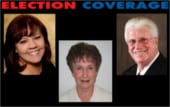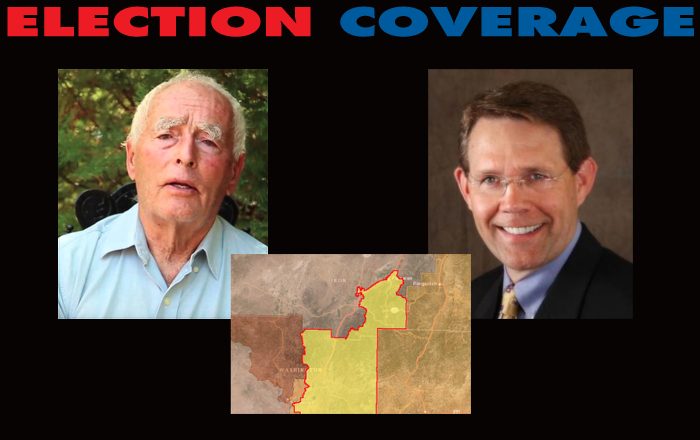ELECTION COVERAGE: Ken Anderson challenges Republican Brad Last for House District 71 seat

Written by Brent Bonner and Michael Flynn
As Election Day nears, the race between Republican incumbent Brad Last and challenger Ken Anderson for the Utah State Legislature is entering the final stretch. A largely rural district, Utah’s legislative District 71 encompasses much of the southeast portion of Washington County and some of Iron County, reaching as far north as Parowan and as far east as Springdale and Hildale.
Elected in 2002, Last has represented District 71 for more than 11 years and has served on a variety of house committees, including the education committee and the economic development task force. Last lives in Hurricane.
Anderson, who is originally from Wyoming, holds a master’s degree in city and regional planning, and is one of the founding members of Citizens for Dixie’s Future, a local group that focuses on environmental and development issues facing the region.
Anti-discrimination bill
Anderson said that he supports a law proposed by Utah State Sen. Steve Urquhart that would make it illegal to evict or fire somebody because of their gender identity or sexual orientation. The bill was shelved last year because of concerns that a debate on the subject could harm the state’s efforts to petition the Supreme Court to overturn a federal court ruling on the legality of same-sex marriage in the state. Now that the Supreme Court has refused to consider Utah’s arguments in the case, Urquhart has stated he will resubmit it during the upcoming session.
“We have to be open to everybody,” Anderson said. “If we are talking about equality, this is just another phase of equality. People in their private lives should be able to do what they want, as long is it is not bothering or hurting anybody else.”
Last, however, said that while he doesn’t support unfair discrimination of any kind, he thinks that anti-discrimination laws tend to cause more problems than they solve.
“I just don’t think we ought to start naming groups of people when we are dealing with discrimination,” Last said. “You get into a situation where you have a hard time determining where to stop.” Last said that he doesn’t intend to support the bill.
Public lands
The candidates stand in sharp contrast regarding Utah’s battle to gain more ownership and control of federal land within the state. Last said he supports efforts to fight the federal government in court because he believes that Utah is in a better position to manage them.
“Utah could do a great job of managing the land within its boundaries,” Last said. “I think we care more about the land than anybody else does. It means a lot to the families that live in Utah, and I think we can do a great job.”
Anderson, however, said he thinks Utah has a terrible record at managing public land. He pointed to school trust lands, which he said have been dreadfully mismanaged by the state.
“Utah was given several million acres of school trust land, known as SITLA,” Anderson said. “It was wasted like crazy for the first 150 years. I feel there needs to be a public audit of SITLA. There is a lot of things going on there that are not helping the schools. Land deals are being made and staff members are receiving commissions of $20,000 and $30,000, as if they were realtors.”
Anderson said that he believes that instead of fighting the federal government, residents’ interests would be better served if the state cooperated with them.
“They could really make a lot of economic value from these lands,” he said.
Lake Powell Pipeline
One of the most hotly contested issues facing southern Utah is the proposed Lake Powell Pipeline, a project that, if undertaken, would connect Washington and Kane Counties with fresh water from Lake Powell on the far eastern border of the state.
Estimated by the Washington County Water Conservancy District to cost nearly $1 billion to complete, the pipeline project would be funded through state-issued bonds and repaid by Washington County residents over a 50-year period. While Last said he is firmly in favor of the project, as he currently understands it, Anderson said he wants to see more information, public discussion, and transparency within the water district before he’s prepared to lend his support.
“It needs to be a comprehensive part of the comprehensive master plan for all of southern Utah,” he said. “This is a huge project of some $2 billion to $3 billion. It needs to approved by a vote of the people in the area it is affecting.”
Anderson said that he doesn’t feel the water district is sufficiently accountable to the residents it serves, and should not make the final call on such an expensive public project.
“The problem with the pipeline is that it is run by an agency that is not an elected body,” he said. “They are chosen by the county commissioners at the request of the water district manager. The board should be elected.”
Last said he believes that Utah needs the pipeline.
“It’s not just important; it’s critical,” he said. “We live in a very dry area and we have tapped out the resources around here.”
While he said that he would like to see southern Utah increase conservation efforts, he doesn’t believe that conservation alone will meet the water needs facing the region.
“Even though we are making significant efforts in the way of conservation, we need to do more and we will do more. However, I still feel like we need to develop more water,” Last said. “I think we have the responsibility to people 50 and 100 years down the road to develop infrastructure so the we can have a thriving economy.”
Liquor laws
While Last would like to see continued efforts to increase the number of liquor licenses issued by the state, he supports the controversial “Zion Curtain” law, making it illegal for restaurant workers to pour alcoholic drinks in sight of their customers.
“I feel like we ought to perhaps open up more licenses for full-service restaurants,” he said, adding that the tourism industry is vital to the southern Utah economy, and he thinks that local leaders create an environment that makes them feel welcome to the state. “To avoid a negative impact on tourism, we should make it so people can have a glass of wine or bottle of beer with dinner.”
However, he said that while he recognizes that it seems odd to some visitors, he believes the “Zion curtain” laws protect kids from the consequences of underage consumption.
“We are trying to help make it not necessarily look cool,” he said.
Anderson said that the state loses large amounts of money each year due to overly aggressive alcohol restrictions.
“Utah has a bad reputation for being set aside, for not being part of the normal character,” he said. “People drive to Mesquite and Las Vegas to purchase their liquor. That’s stupid! All they are doing is paying Nevada the taxes that would otherwise settle here.”
The election will be held on Nov. 4. For information about how and where to vote, visit vote.utah.gov. For additional info about the candidates, visit their respective websites:
Ken Anderson
Brad Last
ALL ELECTION COVERAGE:

Ipson, Hawker, Judd vie for Utah House District 75
In Utah State House District 75, which roughly occupies the northwest corner of Washington County including a large portion of St. George, three candidates are vying for the seat in the Utah House of Representatives.




